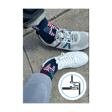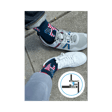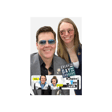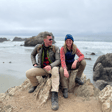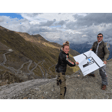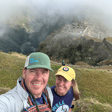Become a Creator today!Start creating today - Share your story with the world!
Start for free
00:00:00
00:00:01

Ep, 49: Everyday Oral Surgery x Between Two Teeth: Overcoming Challenges and Fostering Wellness in Dentistry (Part 3)
Join us for the concluding part of our collaborative series with Everyday Oral Surgery and Between Two Teeth. In this episode, we delve into overcoming challenges and fostering wellness in dentistry. From shedding the chip off your shoulder to embracing a growth mindset, we discuss strategies for personal and professional development.
This episode is a must-listen for dental professionals seeking to thrive in their careers. Tune in for #DentalWellness, #ProfessionalGrowth, and #MentalHealthAwareness. Subscribe now for insightful conversations and actionable advice!
Transcript
Introduction to Dr. Grant Stuckey and Episode Overview
00:00:00
Speaker
Hey there, guys. Between two teeth, we usually don't talk about teeth, but today you're in for a special treat. We're talking about teeth. We're talking about oral maxis facial surgery and periodontics with our good friend from the podcast, Everyday Oral Surgery, Dr. Grant Stuckey. Please give a listen.
Challenges in Bridging Dental Specializations
00:00:20
Speaker
Very well said. I think you just, I mean, that's the big, you hit it on the head and it's just that it's hard for, it's hard to step across the aisle, especially if you come from more years of education. I mean, if I can put myself into, I can have sympathy for it. You gave a lot of your time, the hours are forever more intense.
00:00:44
Speaker
and the cases there's more there's more on those cases and what bob and i talked about initially as far as just our differences and similarities in training you know something a period honest does is the alveolar ridges and we get a big magnifying glass and we zoom in on the alveolar ridges for three years
00:01:05
Speaker
bone grafting, soft tissue, suturing, all different types of tools and instrumentation, everything to get that extra millimeter. And sometimes an extra millimeter matters, and sometimes to Bob's point that he makes sometimes, hey, the body's gonna heal, and it's more important just for the body to heal than to get an extra millimeter. And so it's really, Grant, exactly what you're saying, knowing how to get that chip off your shoulder and knowing when to cross the aisle,
00:01:34
Speaker
And then also, one of common I've heard from an oral surgery buddy is that, hey, I tried to work with a periodontist. And one, I wasn't impressed. And two, they kind of blew me off. So I'm not going to do that anymore. Like any profession, there's a spectrum of personalities on both sides.
Encouragement for Open-mindedness and Collaboration
00:01:54
Speaker
And hey, if it didn't work out with one periodontist or one oral surgeon, try not to have that.
00:02:00
Speaker
uh, taint your view for the entire profession. The next one you meet might be completely different. Uh, and, and so just kind of holding up the greater good and, and trying to maybe bypass that first tricky personality that you interacted with could help. Here's what I would say. If you're in a coffee shop and you turn around to the person behind you,
00:02:23
Speaker
they can do things, many things, a lot better than you can do them. And if you are closed-minded and if you think that you can't learn something from someone else, you're not gonna grow and someone's gonna pass you by. Sure. Totally agree. Gotta drop it and learn.
00:02:51
Speaker
learn from each other, for sure. And as I said, I'm really encouraged what our specialty is doing.
Wellness and Patient Safety through Cross-specialty Collaboration
00:02:58
Speaker
I love our specialty. I think our training is great. There's many things we can do, but there's also so many things that we can participate and be leaders with others, you know.
00:03:11
Speaker
on patient safety issues regarding anesthesia, on things like well-being. Right now, provider wellness is a huge issue. Steph, I know you're a wellness ambassador with the American Dental Association, and we had a chance to have, what was the meeting they just had last year? It was the well-being summit. The well-being summit. Amos was the only specialty that was represented there.
00:03:39
Speaker
And I had reached out to Dr. Paul Schwartz and said, hey, this is happening. He goes, I am passionate about this. This is something we're starting a provider program through AMUS for substance use disorders, and we want to be there. And he was there, Karen, the executive director of AMUS was there, and Deb Sacco, trustee with AMUS, was there as well. And they were in the front row. So some things are happening.
00:04:08
Speaker
One of the things I like to do, I like to push. Unfortunately, sometimes that causes problems. But like with working in this kind of model, we've been pushing it and we're speaking at Amos and people are picking up some of that messaging.
Personal Growth and Interdisciplinary Learning
00:04:27
Speaker
Yes in question for Grant and Bobby here So what in grant you had mentioned you had a shed whatever layer and just say hey, I am gonna reach across the aisle I'm curious I you know that you know, there is something about some you know procedure or something you saw from a period honest that you were like Yeah, maybe there's something different and so between you and Bobby What's your why why did you even you know, how did you make that that leap that jump?
00:04:58
Speaker
Well, so for me, it was, um, in the implants, placing implants in the aesthetic zone. And I'm a surgeon who like, I got a lot of great training in our implants. I placed over 150, 200 implants for an oral surgeon. That's a lot in residency. And so I felt pretty good, you know, thought I knew what I was doing. And then, um, I got out and.
00:05:25
Speaker
I had some bad cases with some aesthetic zone cases that didn't work out like I wanted it to. Some of the offices would start saying, let's go to this periodontist set of Dr. Stuckey because he had these couple of bad cases.
00:05:46
Speaker
Our office has always screw up the schedule. And so I'll like see his follow-ups on my schedule and they'll like come to me for the uncovering. It's like, you know what, assaulting insulting things, slap your face, the paradise, that's the implant and you do the uncover. It's like, talk about humiliating. But I'm the kind of person who's like, if they're in my chair, I'm going to help them out. I'm not going to be like, Hey, I didn't do this implant.
00:06:11
Speaker
And so I would text this guy, hey, it's looking good. Here's some pictures. What do you think? Are you cool with me on covering this implant or doing whatever it needs to be done? And he's a pretty chill guy. And as I was like, Oh, for sure. Thanks for doing that. Um, and so I started talking to him, Hey, you know, I really like what I'm seeing here on some of your follow-ups. It looks good. I look, you know, I'm taking these CBC teas of the, the healing looks great. What are you doing? You know, can you give me some insider information?
00:06:38
Speaker
And so for me, it was just the desire to do better and help my patients and have better results. And I was able to kind of get over any pride. It probably helped that this periodontist had been out of practice much longer than I had and was much more experienced at implants. And so it was easier for me just to drop all pretenses and say, hey, man, what's going on? I need some help. And so that was great, I think.
Mutual Learning between Oral Surgery and Periodontics
00:07:06
Speaker
Um, to me, it's like kind of analogous to like, you know, how the neurosurgeon and an orthopedic surgeon, they both work on the spine, but then they both work on a bunch of other stuff that's not related. And so, cause I had a back surgery and I was like, kind of going back and forth, who's better? And they all pitched their things about all the neurosurgeons going to be more careful with the nerves and they're not going to screw things up. They're more delicate orthopedics. Well, the orthopedics just going to get her done, you know, like that's what we do.
00:07:36
Speaker
We take out some big chisels and we start whacking, you know? It's like, that's the analogous to the oral surgeon and the periodontist. I don't know. What are you guys thoughts on that? You know, I had a neurosurgeon and an orthopedic surgeon in my MBA class and they had constant banter back and forth. But I like what you talked about there. Just, you know, just our preconceptions or preconceived ideas. If you don't want to learn and get better, then don't listen to a single thing we've said.
00:08:05
Speaker
Just turn off the turn off the podcast right now and grant's gonna edit that out It's like I cannot believe they just said but seriously not do it. Yeah Well grant I did I appreciate the vulnerability on your story I I've had you know, I and I can I can relate being in the phase of my career where I am new in practice I can relate to that in a big way you came out and you were highly confident and
00:08:29
Speaker
And it's just, I mean, we need providers, quite frankly, like you grant that are putting the patient first. And not only that is after you after you asked, you know, for just like, hey, you know, what do you think on this? Think of how many residents have benefited from your your branching out.
00:08:49
Speaker
And now when they get out, they're going to be the person that someone might ask and say, Hey, how do I do this? You know, seek first to understand and be okay. Asking. Can I ask you a question? You didn't answer my first one. What's your question? Well, my question to you and Grant and Grant had a great answer was that I, you know, why did you even like, what was your why? Why did you reach across the aisle? Cause I wanted to get better.
00:09:14
Speaker
And we had the concept of a multi-specialty center, and we needed a periodontist to complete that model. And then just me personally, I felt good about myself and thought, OK, yeah, I need to learn. I'm better if I learn. And you helped me on a long learning journey. Now, my question to you is, what did you learn by working with an OMS?
00:09:44
Speaker
a ton. I mean, I like, yeah, max max on my, on my perspective, it really, it helped me appreciate in a big way what you guys go through and gals go through. It's,
00:10:00
Speaker
It's it's a phenomenal you know my program director it talked about your respect and ego in our residency and he goes some of the people that definitely have earned the right to have an ego are
00:10:15
Speaker
our oral maxillofacial surgeons because of what they go through to benefit dentistry as a whole. And so yeah, I've learned so much from Bob just in a emergency management of the patient, the medicine.
00:10:31
Speaker
Man, it's what I am constantly trying to catch up on in our practice as we see some of the sickest patients in our area. I have to scramble to catch up on the medicine and that's something that Bob's helped with a lot. From an IV sedation perspective and a patient safety perspective,
00:10:54
Speaker
Emergency management and then just, you know, technique and working with other providers.
Effective Communication and Leadership in Dental Practices
00:11:02
Speaker
One of the cool things that I think oral surgeons bring to the table is how they interact with the community and their position in a referral group.
00:11:13
Speaker
And so I've been able to benefit off of that, off of those relationships. And I've been able to benefit with how patients just kind of, you know, look and learn from you and how our providers look and learn to you. Like that. Like that a lot. You know, something I've seen, which is kind of unfortunate is when you're in this group setting, oftentimes I see the oral surgeon
00:11:40
Speaker
almost throwing up their hands in regards to implants and saying, you know what, that's fine. The peridot can just do implants and I'll stick to wisdom teeth. And, you know, I mean, wisdom teeth are easier and implants, they're just more follow up and more problems can happen. So yeah, screw trying to learn more about implants or do more or anything like that. Just take them. And, you know, that type of a thing. I've seen that happen with some friends of mine.
00:12:07
Speaker
And I refuse to do that because I had great training and implants. I love doing it. And so for me, it's the opposite direction, but I would hate for that competition there just to make one of the other kind of shrink and the other grow. I'd like to see both grow together and learn. Do you know what I'm saying?
00:12:27
Speaker
Oh, absolutely. There's no reason that as a provider, if you want to just do wisdom teeth, that's great. But absolutely, to your point, Grant, if you are someone who is like, no, I had great training in implants. I'm not going to step aside here because I find the joy in that. That's part of my profession. That's part of what I want to do. I like what Grant said there, grow together. If you don't want to grow together, turn off this podcast.
00:12:53
Speaker
Grant will never invite us back. No, but it's true, you know, just if you can grow, you can learn, you got to put your ego where it needs to be. Educate your referrals. You need referrals with a more flexible mindset. Some referrals have interacted with the oral surgeon that they really like and they have no room for a period honest.
00:13:18
Speaker
And some referrals, it's the exact opposite. And one of the things that Bobby and I had to do with with our referrals is really get them into a flexible mindset of look, you're referring to our practice, and we're going to put the patient above everything else. And together,
00:13:35
Speaker
we are going to to care for this patient and that is that has worked uh tremendously and uh it just comes back to communication yeah and and it gets back to Grant's point if it is a DSO there there needs to be leadership that says this is important to us and you know as a regulator I've seen DSOs evolve and
00:14:03
Speaker
You know things from ten years ago they're different now and patient satisfaction risk mitigation you know financially it's a disincentive to have work that needs to be redone.
Advice for New Dental Graduates on Interdisciplinary Practice
00:14:18
Speaker
And if you're a resident looking at a DSO model, it's kind of like asking about residency programs with the program director. When you're interviewing, say, hey, how are patients divvied up? And how do you guys treat the different specialties?
00:14:34
Speaker
Let's do to get to grants point of you know if if you want if you're a periodontist that's in the dso you're a new grad. What would you say to an oms to say can i come in and.
00:14:50
Speaker
watch you do a case so the scenario is i'm a new grad you're a new grad you just started with this dso i'm an oral surgeon i've been out in practice for 20 years right i'm a little bit cranky so i i'd want to before signing on the dotted line i that's a scenario that a that a periodontist wants to be uh careful on
00:15:10
Speaker
if you have an established oral surgeon at this dso office you wanna it depends on what what procedures you want to do as a period honest but you need to ask questions about okay what how am i gonna be treated as far as how do i get patient so let's get to let's get to the question though about how you gonna interact with me i'm grumpy old
00:15:31
Speaker
Well, that's my point is that relationships, the foundation has to be there. And if you walk into a situation thinking you're gonna place a lot of implants, I've had some corporate offices when I was looking for places to work, you know, five years ago, I was like, hey, you know, I'm a periodontist, I'm looking for a job. And they're like, we don't have any use for a periodontist in this corporation. We just hire oral surgeons and that's it.
00:15:59
Speaker
And I'm like, Oh, okay. So that kind of got me thinking like the foundation's important. You got to figure out what's going on, but say you're in there. First thing, have coffee with the oral surgeon. You want to, that oral surgeon is got to be your best friend.
00:16:16
Speaker
and now is that true it really is because you your it's the person who is going to be doing the most similar things to you at the office and what i found is siblings who are similar or friends who are very similar perhaps might fight a little bit more and especially if you're new in practice you want to kind of have you want to have a foundation
00:16:40
Speaker
a relationship with this person versus leaving it to chance, which if you leave it to chance, the chances of it going south are high. Okay, I'm going to answer my own question then because you don't like my answer. Well, I get what you're talking about. I was trying to get a where the rubber meets the road. So we're going to change the scenario. You're a periodontist. You've been in practice for 20 years. You've got experience. I'm a new grad. I'm an OMS. I'm going to look at it and say, how can I
00:17:08
Speaker
build goodwill with this person. And I may say, hey, would it be okay? And now we introduce communication. Yeah, exactly. But I'm going to say, you know, would it be okay if I came in and just kind of watched you do X procedures? Specifically, I'd really like to kind of learn and see just kind of what Grant said.
00:17:29
Speaker
You've got good outcomes. I'd love to kind of learn some of your specific question was not not that you create a relationship with the other provider. Your specific question is how do you do that? How do you do it? So this is an excellent example of how two different people.
00:17:49
Speaker
Bob's asking this question, I'm answering it going, how could you not glean from this? And Bob's like, I'm gonna ask it again, because you didn't answer it. This is why you need to have a working relationship. And I don't listen well. I'm working on it. I hate to listen. I get that. And this is the other thing, if I didn't know Bob, I would be so offended by that. But I know him and I'm like, okay, I'm gonna let these go. I'm gonna let it go. Because maybe I'm not clear.
00:18:17
Speaker
How about that? So you're not. One of the things we're talking about at Amos is actually being clear. Poor Grant this morning. He's just like, dear diary, I'm going to let these guys talk. I love it. And then at some point I'm going to cut him off. So here's the deal. One of the things I've learned, if you want to be effective, you are well served to be clear and kind.
00:18:40
Speaker
Brene Brown. Brene Brown. That was something we learned at Brene Brown. I like that. Clear and kind. We think we're clear. Most of the time, we're not clear. And being kind, we meant to be kind, but how many times have we not been kind if we're talking to our assistants or talking to a colleague?
00:19:01
Speaker
You are effective if you're clear and kind. You can give hard, clear information in a kind way, but that takes nuance, and it takes practice. What do you say? Well, I want Grant to feel like he can definitely ask questions and say whatever he wants to say. Well, it's his podcast, yeah. Because I'll talk forever. Turn it off. We will both talk forever. But yeah, Grant, what are you thinking as we
00:19:28
Speaker
Well, I love this topic and this point you're talking about, especially like that initial conversation that can happen there between how do I get in the door or how do I let someone in the door?
Foundations for Collaboration between Periodontists and Oral Surgeons
00:19:40
Speaker
Because I think first off, like when I just hear Bob putting this scenario out there, the old cranky surgeon and the young periodontist saying, you know, can I come in? I think the old cranky guy,
00:19:53
Speaker
is, you know, very often going to think, well, I don't want this young period on just coming in and stealing my secrets and learning stuff. And, uh, no, you know, let's just, let's keep our distance here. And I've learned one good way to get in the door is to be very specific with your why. And also like Bob saying, throw in the compliment and the kindness. So usually I'll be like, you know, Hey, um,
00:20:23
Speaker
Dr. Guayo, I just keep seeing good cases from you and I hear from other people who have worked with you that you suture really well. Do you mind if I stop by? Because I really want to up my suture game and just see kind of your suturing technique. And all of a sudden, he's very...
00:20:39
Speaker
Not flattered, but like, oh wow, this is, that's pretty cool. This guy has a specific need. He wants to learn a little better. Come on in. Like it'd be rare for him to be like, no, I don't want you to learn my suturing technique. That's a secret. And start small.
00:20:54
Speaker
You'd be surprised. Sometimes people will be like that. And I, you know, okay. So you just hit it on the head grant. It's all about, it's about the foundation. There is so much upside and there's so much potential here with, uh, perio and oral surgery working together, but the foundation has to be right. And you know, Bob, when you ask the question, you know, what do you, I mean, how do you do this? What do you look for? If you don't have two willing participants, it's not going to happen.
00:21:23
Speaker
And if you don't want to grow, it's really hard to be willing. And this is where it takes
Leadership and Learning for a Diverse Dental Practice
00:21:31
Speaker
leadership. It takes leadership perhaps from above, or it takes you as a practitioner, if you're an independent contractor, to step up as a leader and say, if we want to do our best, we are going to be served to learn from one another.
00:21:46
Speaker
And yes, and if you talk about motivators, you know, even from a business owner perspective, financial motivation, our practice would not have grown if we could not work together. If we didn't make, if we didn't, you know, do the groundwork with referrals, if we didn't do the groundwork, you know, just kind of figuring out how we were going to do things, it would have imploded quite frankly.
00:22:11
Speaker
Yep. It takes understanding, it takes patience, and it takes communication that is clear and kind. And sometimes I'm very unclear and not kind.
